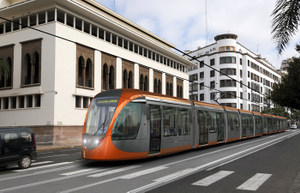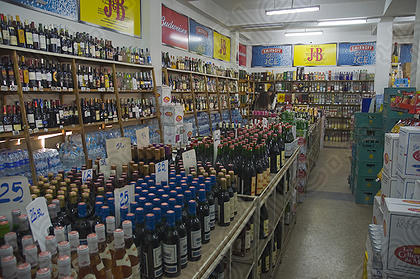Free Ceuta (Sebta) and Mililla activists detained
 |
| Moroccan activist make their statement |
Four Moroccan activists from the Committee to Free Ceuta (Sebta) and Melilla were briefly detained at dawn on Wednesday this week after trying to occupy the Penon de Velez de la Gomera fortress off the Moroccan coast. Both Ceuta and Melilla are considered by Moroccans as their territory.
A total of seven activists reached the fortress, on a peninsula 130 kilometers west of Melilla. Arriving on foot at 6.30am, they tried to place flags from their movement. Stopped by Spanish military border police, three activists fled while the other four were questioned, identified and then released, said a Spanish enclave government delegate, El Berkani.
Committee activists have made several attempts to occupy Spanish-occupied rock fortresses recently, El Berkani said. In 2002, the landing of Moroccan troops on Spain's Perejl Island in the Strait of Gibraltar caused a diplomatic incident between the two countries.
The Casablanca tramway - nearing completion
The construction work on the first tramway in Casablanca is nearly completed with October the 15th set as the date for test driving trains in actual traffic conditions and checking all equipment. The October date is nearly two months before the expected commissioning of the giant urban development.
Work on the railway platforms is on schedule with finishing touches underway with full completion expected on September 10.
The 22 km of overhead contact lines are in place and 15 km has already been electrified.
The control centre of the operation will initially run 37 trains, but capacity has been built into the system to accommodate 49 trains and in anticipation of new line extensions or an increase in the number of trains.
The first tramway line, which crosses the city from east to west covers a distance of 30 km, linking the main areas of the city include 48 stations and stops travelers. Each train, with a length of 65 m, can accommodate 600 passengers with 100 seats, an expected number of 250,000 travelers daily via a fleet of 37 trains.
To give a new visual identity, it is also planned the construction of two large squares - UN and Casa Voyageurs and the planting of 2,000 trees. In all, some 90 hectares of the city of Casablanca which will be fully refurbished.
"Human Rights" delegation criticised
Human rights observers held meetings with tribal leaders, peacekeepers and Moroccan officials on Monday as they wrapped up a visit to the Morocco's Western Sahara.
Their visit comes amid a row between the United Nations and Rabat, which has demanded the replacement of new UN peace envoy Christopher Ross, whom it accuses of "bias" in efforts to resolve the status of the territory.
The delegation, led by Kerry Kennedy, of the Robert F Kennedy Centre for Justice and Human Rights, and Mary Lawlor, director of rights group Front Line Defenders, held morning meetings with tribal leaders and the region's governor, an AFP reporter said.
In the afternoon, the group visited the headquarters of the UN peacekeeping mission.
On Sunday, the delegation held a closed meeting at their hotel with Sahrawi pro-independence groups, who repeated their demands to see the mandate of the peacekeeping mission extended to cover human rights. It also met pro-Moroccan groups.
However there has been widespread cynicism about the biased nature of the trip. Richard Miniter, writing for an on-line journal criticised "...chumming around with a group credibly linked to terrorists who are at war with the United States, and consorting with drug smugglers who are essentially at war with all civilized peoples."
Morocco is a frontline state in America’s war against “Al-Qaida in the Islamic Maghreb” (AQIM), a branch of the late Osama bin Laden’s terror network. This is the group that plotted to bomb the U.S. Embassy in Bamako, Mali. It schemed to kidnap drivers on the Paris-Dakar road race. It has held for ransom more than a score of Europeans.
AQIM also plots to kidnap or kill American diplomats all across North Africa. Morocco is a constitutional monarchy with an elected government, so undermining it hurts a vital U.S. ally in both the war on terror and the war on drugs.
Miniter claims that both the terrorists and the drug lords have been repeatedly linked to the Polisario Front — the same anti-Moroccan rebel group that hosted the Kennedy women.
Miniter is scathing about the visit saying "Two scions of the Kennedy clan went to Morocco and came away with a breathless tale of police brutality against separatists. The problem? The separatists represent the Polisario Front, a brutal rebel group linked to al-Qaida and drug smugglers. Their first-hand account, which was published by The Huffington Post, doesn’t mention that their radical chic tour continued to the Polisario Front’s remote Saharan camps in Southern Algeria, where the rebels used the naïve Kennedy women for all the propaganda value they could wring out of them." Read the full article here
A source within the Moroccan government, not authorized to speak on the record but with direct knowledge of the circumstances surrounding Kennedy's visit, expressed concern for the peace process. "Kennedy and her team, after asking for Moroccan assistance to organize the trip, refused to meet with anyone not supportive of the Polisario." Further, the official was adamant that the Moroccan government communicated to Kennedy and the RFK Center they were "welcome here (Morocco,) could stay as long as they want, and we are pleased to arrange meetings with Moroccans and Sahrawis with differing views than those within the Polisario."
Inquest into couple's deaths in Morocco
A joint inquest into the deaths of a couple from Worcestershire killed in separate falls while on holiday in Morocco is due to take place today. Roger and Mathilde Lamb, from Pensham near Pershore, were with their four sons in the tourist resort of Essaouira last August when they died in separate incidents.
Mrs Lamb, who was 43, is believed to have fallen from the apartment her family were staying in on August 17. She died the next day. Mr Lamb, who was 47, died after falling from a separate building a few days later.
Mechanisation gives Argan oil a boost
A Moroccan university professor’s interest in the economic preservation of the declining Argan tree has resulted in women harvesting the tree’s valuable oil increasing their income by more than ten times.
Zoubida Charrouf (pictured above), a professor at Mohamed V. University in Morocco, initially developed an interest in the tree and its oil for conservation reasons, but has since improved the extraction of oil by establishing processing cooperatives – such as the Ajddigue and Taitmatine cooperatives – run entirely by local women. This commercialisation of Argan oil has boosted business in the cooperatives and emancipated the women by offering them a meaningful livelihood. Charrouf says that Argan Oil “should readily find a place of choice amid the most profitable oils for human health”. Celebrities as diverse as Sophie Dahl, model and writer, and Heston Blumenthal, one of Britain’s leading chefs, are fans.
The commercialisation was achieved by mechanising some of the tedious production tasks, such as grinding the nuts and pressing the oil. This sped up the operation and also improved the quality of the oil, doubled its shelf life, and reduced waste. Membership in the cooperatives now ranges from 35 to 40 women, who now earn about $8.60 a day, an increase of more than ten times from when the projects began in 1997. Argan oil is now a high value niche product on the international market, and what began as a cottage industry could now provide more employment to Moroccan women.
”At the time [the project started], we were losing more than 600 hectares of Argan forest each year,” says Charrouf. “But we also wanted to convert this ecological problem into an economic opportunity. I knocked at several doors, but no one believed in my project. Now Argan oil is known around the world.” The economic opportunity that Charrouf uncovered for Moroccan women is now being supported with grants from the Moroccan government and the European Union.
“Being part of the cooperative freed me from tedious domestic work in people’s homes,” said one member of the Taitmatine cooperative. “Now I’m learning to read and write and I’ve learned how to ensure the quality of the Argan kernels. The cooperative has made me more independent. I’ve been able to visit other cooperatives in other provinces. I’ve seen how girls and women like me have been able to shape their own destiny and move ahead to develop their cooperatives.”
The hunt for oil in Morocco heats up
Morocco is becoming an increasingly attractive prospect for International Oil Companies (IOCs) looking for new exploration opportunities to add to their portfolios .With one of the most attractive tax regimes in the world and political stability unlike many of its neighbours, companies like Cairn are moving into Morocco.
Cairn will buy 50 percent of the Foum Draa blocks in Morocco, a third purchase this year after acquiring North Sea explorers Agora Oil & Gas AS and Nautical Petroleum Plc. After investing nearly US$ 1 billion in Greenland and still looking for results Cairn needs to diversify its exploration efforts in new areas and Morocco and the Mediterranean fits the bill. Cairn has sold most of its Indian holdings and thus has money to invest.
Much of Morocco remains unexplored and although there have not been significant finds yet the 3 D seismic surveys and geographical data are promising , particularly for offshore. The Edinburgh-based Cairn will pay US$ 60 million for fifty percent stake in a license shared with a number of small companies at Foum Draa block located in the western offshore of Agadir.
The current license holders San Leon, Serica and Longreach will hold interests of 14.2 percent, 8.3 per cent and 2.5 percent respectively, while the Office National des Hydrocarbures et des Mines (ONHYM) will hold 25 per cent.
Recent news flow from Morocco is a “very positive indicator” for Tangiers Petroleum which has significant acreage in the sought-after stretch of coastal north-west Africa, according to City broker Old Park Lane.Genel Energy has farmed into the Sidi Moussa block, and its investment together with Cairns amounts to deals worth in excess of $100 million and committments to drill two wells in the area.
Morocco has become a honey-pot for the ambitious mid and large-cap exploration groups as the geological understanding of coastal West Africa has increased.
Alongside Genel and Cairn, are Total , Repsol , Anadarko and Kosmos which are all active in the waters of the country’s coast.
Compared with its near neighbours Morocco is still largely under-explored, although this is changing with the latest influx of oil companies.
Moroccan Sufi expert dies
The specialist on Moroccan Sufism, Zakia Zouanat, died this week.
Zakia Zouanat Anthropologist, specialist of Moroccan Sufism and author of an important work on the extensions of this heritage in the world, died Thursday night at the age of 55, following a long illness.
Zouanat, who was a researcher at the Institute of African Studies of the Mohammed V University in Rabat, is particularly known for her work on the Sufi heritage aspects of Morocco and its influence around the world. Her seminal work on this subject is "The Kingdom of the Saints" (le Royaume des Saints).
"In the era of globalization the soul is desperate. How does one give to the other if one does not know oneself; if one has not preserved what we value most, our identity? Sufism is the central part of the Moroccan identity!" Zakia Zouanat
The Germans are coming
Lufthansa launches new flights to Marrakech. September 1, 2012 will see the start of flights to Marrakech from Berlin and Dusseldorf, with two weekly frequencies. These air links will meet the ambitions of Morocco in relation to the German market, which in 2011 accounted for 4% of the tourist activity in Marrakech, with arrivals and overnight stays exceeding 70,000 and 165,000 nights respectively. Morocco has set a goal of doubling the number of German tourists in 2020, from 200,000 to 400,000 tourists per year.
Forest fires threaten rosemary plantings
Between January and this week, 326 forest fires have occurred in Morocco, according to figures from the Office for Water and Forests and the Fight against Desertification (HCEFLD). 3406 hectares of vegetation were destroyed, the equivalent of 3,400 football fields went up in smoke. The East is the region most affected by the fires. Near Nador, Berkane and Taourirt, 1866 hectares of vegetation burned in the latest fire. Commercial rosemary is almost certain to sustain damage.
OPINION
Morocco Is on the Path to Change
Hicham Ben Abdallah el Alaoui is a consulting professor at Stanford University's Center for Democracy Development and the Rule of Law, and is the president of the Moulay Hicham Foundation. He is a cousin of King Mohammed VI of Morocco and third in line for the throne. He wrote this piece for the New York Times
The Arab monarchies have survived the turmoil in the Middle East for several reasons. First, the monarchic institution remains deeply linked to national identity in many of these countries because of anticolonial struggle and the historical importance of the institution itself. Second, monarchies have traditionally arbitrated conflicts between different groups and classes, acting as benevolent caretakers of society. They have also allowed other institutions, like parliaments, to represent the people, thus staying above the political fray.
Like Jordan, Morocco is trying to satisfy its citizens by liberalizing instead of democraticizing.
These factors have earned Arab monarchs a respite from the wave that swept away regimes in Tunisia, Egypt, Libya and possibly Yemen, but the respite will not last forever.
In the Gulf, enormous oil revenue has permitted monarchies to initiate new welfare and development programs to deflect public pressure. Geopolitics matter too: it has become clear that Saudi Arabia will not permit the crisis in Bahrain to truly threaten the existence of its monarchy. Likewise, at the international level, the United States and the European Union have little desire to encourage any more instability in this economically vital area.
The issue of monarchical survival has become inextricably entangled with the dynamics of Sunni-Shiite sectarian tension, which pits Iran against the Arab Gulf kingdoms. This discourse has grown hegemonic: not just the monarchies but also oppositionists have internalized these fears, blunting the demand for political reform.
Morocco and Jordan — the two oil-poor monarchies — are trying to satisfy their citizens by liberalizing instead of democratizing. They have turned to controlled political openings cloaked in the language of freedom but intended to perpetuate the status quo. Limited constitutional reforms, tolerance of more opposition and new parliamentary elections are welcome steps, but such measures do not devolve power away from the palace.
And such policies cannot indefinitely quiet the restive middle classes, who are no longer satisfied with constrained pluralism and demand genuine participation. What they desire is not revolution but reformation toward constitutional monarchy, a new system of governance that embodies the spirit of democracy while retaining the historical role of monarchism in these societies. The path to change may be uneven, and sometimes even chaotic, but it has begun.
SHARE THIS!














































